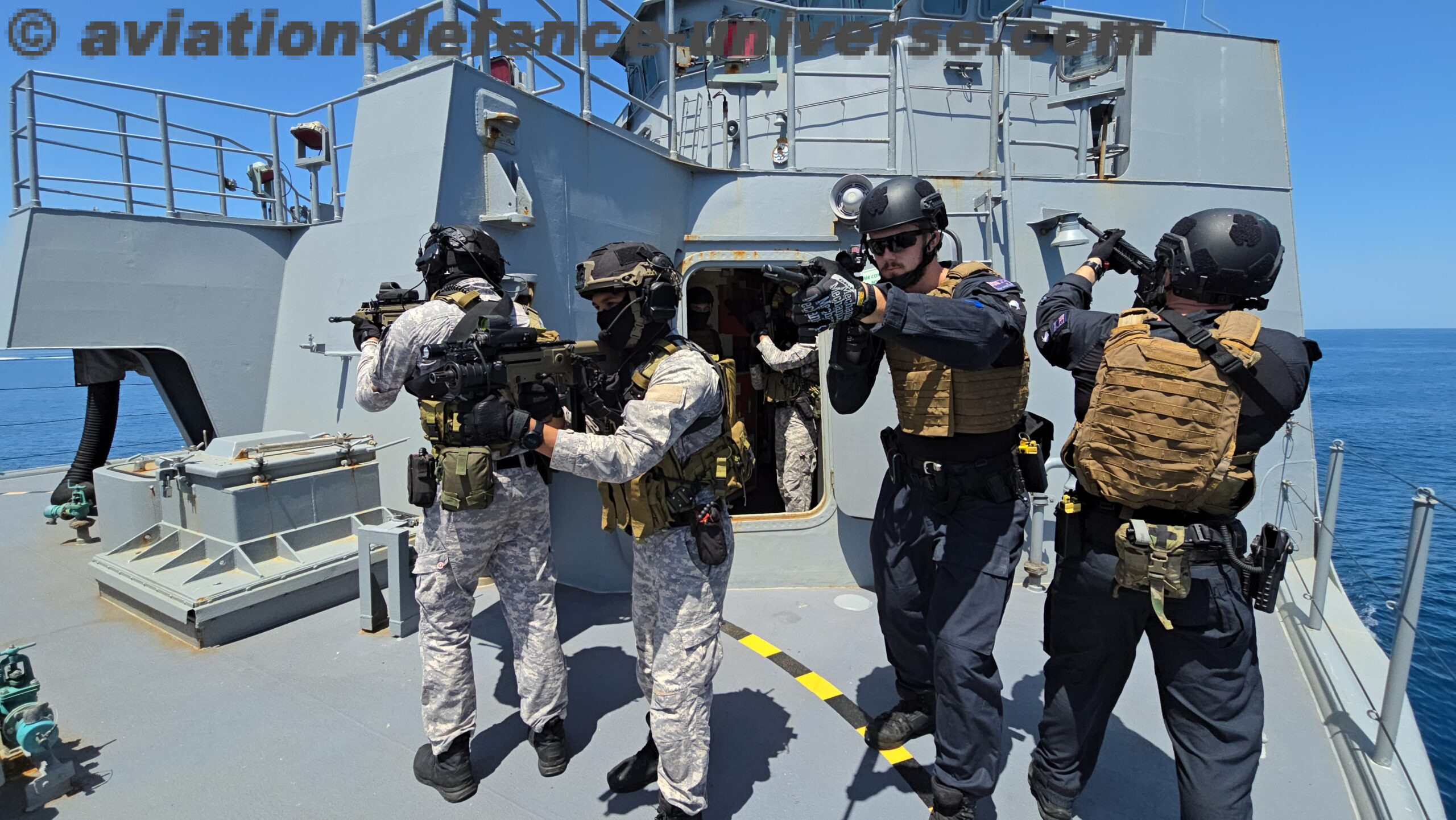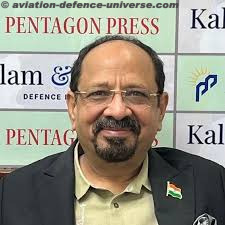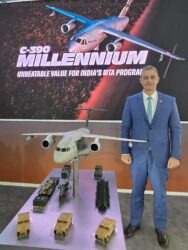- Ashish Kansal on Making India a Global Hub for Personal Protection Systems
New Delhi. 12 April 2025. Protecting Those Who Protect Us – this isn’t just a motto for SMPP; it’s the mission that fuels its relentless pursuit of innovation in personal protection systems. In this exclusive interview, Ashish Kansal, CEO & Director of SMPP, speaks to Aviation & Defence Universe (ADU) about how the company is redefining the standards in ballistic protection for soldiers. From pioneering lightweight solutions to making strides in global defence exports, Kansal shares SMPP’s journey of growth, technological leadership, and unwavering commitment to India’s self-reliance in defence manufacturing.
ADU. SMPP has been a key player in the defence sector. Can you share the vision that drives the company’s growth and innovation?
Ashish Kansal. The essence of SMPP’s journey has always been about protecting those who protect us. Our vision is not just about manufacturing bulletproof jackets or helmets; it is about ensuring that every soldier, every officer, and every individual in the line of duty feels safer and more empowered. Defence technology is evolving rapidly, and we see ourselves as more than just a supplier—we are innovators, constantly looking for ways to enhance protection, reduce weight, and improve comfort. We are committed to strengthening India’s defence self-reliance while also making a mark on the global stage.
ADU. How has SMPP evolved over the years in terms of technology and product development?
Ashish Kansal. Evolution, in our view, is not just about keeping up with technological advancements but about anticipating future needs. Over the years, we have pioneered several innovations, including the use of boron carbide, one of the hardest materials on earth, to develop lightweight yet highly effective protective gear. Our focus has always been on staying ahead of threats—whether it’s by designing multi-hit capable armor, enhancing mobility by using lighter materials, or ensuring that protection doesn’t come at the cost of comfort. We’ve also expanded our product portfolio to offer a comprehensive range of solutions, including helmets, shields, and armor plates, to cater to a broad spectrum of defence requirements. We have added features to our products like Quick Release mechanism to ensure medical assistance is provided quickly in the event of any injury. Our patented Dynamic Load Distribution system ensures the transfer of weight of jacket from shoulders to hipbone or vice versa, reducing soldier fatigue significantly. Our hands-free shield frees the arms of the soldier to use his weapon while providing critical shield protection in case of room interventions.
 ADU. SMPP is a leading supplier of bulletproof jackets to the Indian Armed Forces. What makes your products stand out in terms of quality and protection?
ADU. SMPP is a leading supplier of bulletproof jackets to the Indian Armed Forces. What makes your products stand out in terms of quality and protection?
Ashish Kansal. When you’re in the business of saving lives, there can be no compromises. Our products stand apart because we go beyond just meeting the standards—we push the boundaries of what’s possible. Every piece of protective gear we design undergoes rigorous testing to ensure that it delivers when it matters most. What truly sets us apart is our ability to combine lightweight design with high-impact resistance. The use of advanced materials allows us to significantly reduce the weight of our jackets and helmets without compromising on protection, which directly translates to better mobility and endurance for the personnel who wear them.
ADU. How does SMPP ensure that its bulletproof jackets meet global and Indian standards?
Ashish Kansal. The idea of ‘standard’ is something we view as a starting point, not a benchmark. At SMPP, our products undergo extensive ballistic testing in varied conditions, ensuring they provide real-world reliability, not just laboratory compliance. We were the first company in India to receive BIS certification for bulletproof jackets, a reflection of our commitment to quality. Many of our products also meet international compliance requirements, which has allowed us to gain acceptance in global defence markets. Our priority has always been to ensure that every jacket, helmet, or shield we manufacture meets the highest level of safety, durability, and performance.
ADU. The weight and comfort of bulletproof jackets are crucial for soldiers. How has SMPP worked on enhancing these aspects?
Ashish Kansal. The reality of combat is that mobility and endurance can be the difference between life and death. A heavy jacket may provide protection, but if it slows a soldier down, it becomes a liability. That’s why our focus has been on designing lighter, more flexible body armor that enhances mobility without compromising safety. By leveraging advanced materials like boron carbide, we have developed armor plates that offer superior strength while being significantly lighter than conventional options. Additionally, our ballistic jackets are engineered to transfer weight from shoulders to hip or vice versa, reducing fatigue during prolonged missions. Every innovation we introduce is aimed at ensuring that soldiers can operate with confidence, agility, and maximum protection in the most demanding environments.
ADU. With changing battlefield requirements, how is SMPP innovating its personal protection gear for future conflicts?
Ashish Kansal. The battlefield of tomorrow will be very different from what we see today. Conflicts are becoming more unpredictable, threats are evolving, and protection gear needs to adapt accordingly. At SMPP, we are investing in next-generation armor that not only withstands higher ballistic impacts but also integrates better with modern combat systems. We are also exploring new materials and design enhancements that offer greater flexibility and adaptability. The future of defence technology lies in innovation, and our goal is to ensure that we are at the forefront of that evolution.
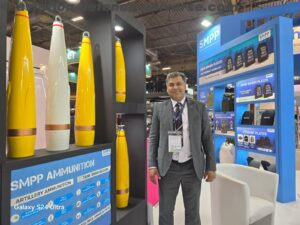 ADU. SMPP has expanded its presence in global defence markets. Can you highlight some recent international collaborations or contracts?
ADU. SMPP has expanded its presence in global defence markets. Can you highlight some recent international collaborations or contracts?
Ashish Kansal. India’s defence manufacturing capabilities are earning recognition on the global stage, and SMPP is proud to be a part of this shift. We currently export to 23 countries across Europe and Asia, and our products are gaining traction for their reliability and performance. Our partnership with Rheinmetall Denel Munition for large caliber ammunition is an example of how we are collaborating with global leaders to combine their latest technologies with our engineering skills to bring high quality products yet at low costs. These collaborations also help us bring the best global practices to our manufacturing processes while strengthening India’s position as a defence export hub.
ADU. How important is research and development (R&D) for SMPP, and how much of the company’s resources are dedicated to it?
Ashish Kansal. R&D isn’t just a function within SMPP—it is the foundation of everything we do. We believe that true innovation comes from constantly challenging the status quo. This is why we invest heavily in research, whether it’s in materials science, armor design, or advanced manufacturing techniques. Our multiple patents in India as well as in USA, Philippines and Thailand are a testimony to our technical achievements realised as a result of this commitment. By focusing on R&D, we ensure that our products are always evolving, always improving, and always ahead of the curve.
ADU. Are you exploring advanced materials such as graphene or nano-technology for next-gen body armor?
Ashish Kansal. SMPP is always experimenting with newer materials as they become available in order to look for lighter, more flexible or better protection properties. Graphene and nano-technology are something which have been in the market for quite some time. However, ballistic solutions incorporating these materials have not be able to show significant impact on performance. Integration of advanced materials is an ongoing process and hopefully some breakthroughs will become available soon.
ADU. As a Make in India company, how is SMPP contributing to India’s defence self-reliance goals?
Ashish Kansal. India’s vision for self-reliance in defence manufacturing is something we strongly believe in. We have not only developed world-class body armor domestically but also significantly reduced reliance on imports. Our ability to manufacture boron carbide armor plates capable of withstanding multiple hits within India has been a game-changer. Government policies supporting indigenization have played a crucial role in enabling companies like ours to grow, scale, and contribute to national security.
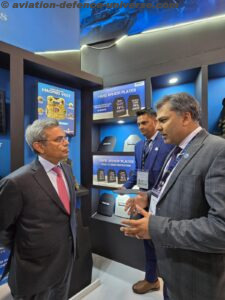 ADU. What challenges do Indian defence manufacturers face in competing with global giants?
ADU. What challenges do Indian defence manufacturers face in competing with global giants?
Ashish Kansal. Competing in the global defence sector is about more than just manufacturing—it’s about credibility, trust, and proving that Indian-made products can match or exceed international standards. Indian companies face challenges such as complex procurement policies, global competition, and stringent regulatory requirements. However, the government’s push for self-reliance and policies like the Positive Indigenisation List are helping create a more level playing field. What’s needed now is sustained policy support and a greater push for defence exports.
ADU. What are SMPP’s expansion plans for the next five years?
Ashish Kansal. SMPP is entering a phase of strategic expansion, with key investments focused on strengthening both domestic production and international presence. A major development is the establishment of one of India’s largest private-sector manufacturing facility for large caliber artillery and tank ammunition. Spread across 800 acres, this facility will significantly enhance our production capabilities, enabling us to manufacture a wide range of large calibre ammunition with a capacity of 2.5 lakh rounds of 155mm artillery shells annually. We expect to commence phased commercial production from Q1 FY 2026, catering to the increasing demand for indigenously manufactured artillery ammunition.
On the international front, SMPP has been steadily expanding its footprint, supplying personal protection equipment to multiple countries across Europe and Asia. We continue to strengthen global partnerships and participate in major defence exhibitions to further solidify our presence in key markets. In FY24, SMPP reported revenue of over ₹108.5 crore from exports, accounting for 21% of our total revenue.
 Looking ahead, we are committed to driving innovation in defence technology, with a strong emphasis on research and development. Our focus includes lighter and more advanced protection products, guided ammunition, and integrated sensor-based defence solutions, aligning with India’s Future Infantry Soldier as a System (F-INSAS) program. By leveraging innovation, strategic partnerships, and a robust manufacturing ecosystem, we aim to strengthen our leadership in India’s defence sector while becoming a globally recognized player.
Looking ahead, we are committed to driving innovation in defence technology, with a strong emphasis on research and development. Our focus includes lighter and more advanced protection products, guided ammunition, and integrated sensor-based defence solutions, aligning with India’s Future Infantry Soldier as a System (F-INSAS) program. By leveraging innovation, strategic partnerships, and a robust manufacturing ecosystem, we aim to strengthen our leadership in India’s defence sector while becoming a globally recognized player.
As India charts a path toward greater self-reliance in defence, companies like SMPP are at the forefront—innovating, scaling, and delivering world-class solutions tailored to both domestic and global needs. Under Ashish Kansal’s leadership, SMPP is not just meeting battlefield challenges of today but shaping the soldier’s protection systems for tomorrow. With strategic expansions, next-gen product development, and a strong focus on R&D, SMPP is well-positioned to be a formidable force in India’s defence landscape and beyond.
As told to Sangeeta Saxena




































